|
June 24, 2011 08:19:06
Posted By DelvecchioRC
|
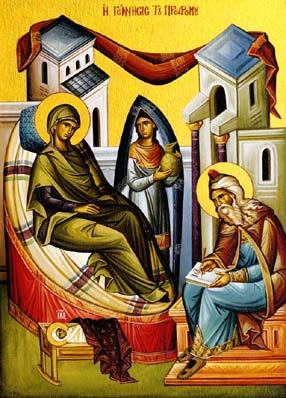
The day of a Saint's death is usually celebrated as his or her feast day, but Jesus, the Virgin Mary and Saint John the Baptist, while not being exceptions to this rule, also have feast days that celebrate their earthly birth. The reason is that St. John (Lk 1:15), like Jeremiah (Jer 1:5) and the Blessed Virgin, was purified from original sin before his very birth (in Catholic doctrine), though not in the instant of conception as in the latter case.
The Nativity of St John the Baptist is one of the oldest festivals of the Christian church, being listed by the Council of Agde in 506 as one of that region's principal festivals, where it was a day of rest and, like Christmas, was celebrated with three Masses: a vigil, at dawn, and at midday.
The Nativity of St John the Baptist on June 24 comes three months after the celebration on March 25 of the Annunciation, when the Archangel Gabriel told Our Lady that her cousin Elizabeth was in her sixth month of pregnancy, and six months before the Christmas celebration of the birth of Jesus. The purpose of these festivals is not to celebrate the exact dates of these events, but simply to commemorate them in an interlinking way.
Christians have long interpreted the life of John the Baptist as a preparation for the coming of Jesus Christ, and the circumstances of his birth, as recorded in the New Testament, are miraculous. The sole biblical account of birth of John the Baptist comes from the Gospel of Luke. John’s parents, Zechariah or Zachary — a Jewish priest — and Elizabeth, were without children and both were beyond the age of child-bearing. During Zechariah's rotation to serve in the Temple in Jerusalem, he was chosen by lot to offer incense at the Golden Altar in the Holy Place. The Archangel Gabriel appeared to him and announced that he and his wife would give birth to a child, and that they should name him John. However, because Zechariah did not believe the message of Gabriel, he was rendered speechless until the time of John's birth; at that time, his relatives wanted to name the child after his father, and Zechariah wrote, "His name is John" and could speak (Luke 1:5-25; 1:57-66). Following Zechariah's obedience to the command of God, he was given the gift of prophecy, and foretold the future ministry of John (Luke 1:67-79).
At the Annunciation, when the Archangel Gabriel appeared to the Virgin Mary to inform her that she would conceive of the Holy Ghost Jesus, he also informed her that Elizabeth, her cousin, was already six months pregnant (Luke 1:36). Mary then journeyed to visit Elizabeth. Luke’s Gospel recounts that the baby “leapt” in Elizabeth’s womb at the greeting of Mary (Luke 1:44). This is interpreted by Christians as John's first act of prophecy.
|
|
June 13, 2011 07:41:39
Posted By DelvecchioRC
|
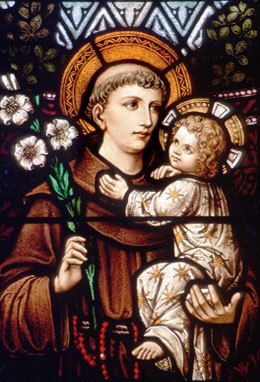
Born in Lisbon in A.D. 1195, St. Anthony, né Ferdinand, was the son of noble, God-fearing parents. He received a good education, and, at the age of fifteen, joined the Canons Regular of St. Augustine which whom he studied Sacred Scripture and the writings of the Fathers. At around the age of 25, he became inspired by the Franciscans martyred in Morocco and decided to join their Order, taking the name "Anthony."
Illness prevented his going to Morocco, so he spent some time in Sicily, in Assisi, and then in Montepaolo his public life began: during the ordination of a group of Franciscan and Dominican friars, it was discovered that no one had been appointed to preach. The superior turned to the Dominicans first because they are the "Order of Preachers," but all declined, saying they were not prepared. So St. Anthony stepped up -- and began to teach so beautifully that word of his talents reached the ears of St. Francis, who blessed his work.
St. Anthony taught at Bologna, Montpellier, and Toulouse, but it was as a fearless orator (he became known as the "Hammer of the Heretics") and a miracle worker that he is most reknowned.
St. Anthony, as a Franciscan, was also famous for helping the poor. At his encouragement, Padua passed a law in 1231 to help debtors who couldn't pay their debts.
St. Anthony died in Arcella, strengthened by an apparition of Our Lord and in the "odor of sanctity," at age thirty-six on 13 June, 1231. After he died, he announced his own death to Abbot Thomas Gallo by appearing to him. His death was also announced to the citizens of Padua by a troop of children, crying: "The holy Father is dead; St. Anthony is dead!" Gregory IX canonized him within the year, the fastest canonization ever.
The people of Padua built a temple for his relics, which were transferred to it in 1263 in the presence of St. Bonaventure. His body was found to be dust -- but for his tongue, which was fresh and red. St. Bonaventure kissed it and cried, "O Blessed Tongue that always praised the Lord, and made others bless Him, now it is evident what great merit thou hast before God."
St. Anthony is the patron of sailors, pregnant women, amputees, fishermen, and the poor. He is invoked against shipwrecks and in order to find lost objects, by women to find a husband, to conceive a child, and to ensure safe childbirth. He is also invoked to see that mail and packages are safely delivered. St. Anthony is most often depicted in art wearing his Franciscan habit and holding a lily and the Christ Child, or sometimes with loaves of bread or a book.
|
|
May 26, 2011 11:34:04
Posted By DelvecchioRC
|
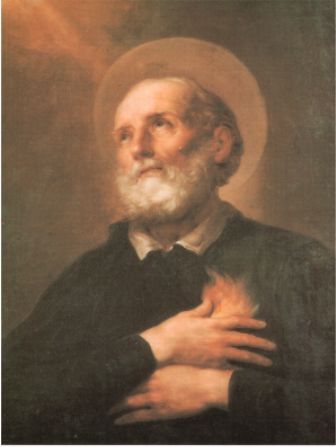
Philip Neri was a sign of contradiction, combining popularity with piety against the background of a corrupt Rome and a disinterested clergy, the whole post-Renaissance malaise.
At an early age, he abandoned the chance to become a businessman, moved to Rome from Florence and devoted his life and individuality to God. After three years of philosophy and theology studies, he gave up any thought of ordination. The next 13 years were spent in a vocation unusual at the time—that of a layperson actively engaged in prayer and the apostolate.
As the Council of Trent was reforming the Church on a doctrinal level, Philip’s appealing personality was winning him friends from all levels of society, from beggars to cardinals. He rapidly gathered around himself a group of laypersons won over by his audacious spirituality. Initially they met as an informal prayer and discussion group, and also served poor people in Rome.
At the urging of his confessor, he was ordained a priest and soon became an outstanding confessor, gifted with the knack of piercing the pretenses and illusions of others, though always in a charitable manner and often with a joke. He arranged talks, discussions and prayers for his penitents in a room above the church. He sometimes led “excursions” to other churches, often with music and a picnic on the way.
Some of his followers became priests and lived together in community. This was the beginning of the Oratory, the religious institute he founded. A feature of their life was a daily afternoon service of four informal talks, with vernacular hymns and prayers. Giovanni Palestrina was one of Philip’s followers, and composed music for the services.
The Oratory was finally approved after suffering through a period of accusations of being an assembly of heretics, where laypersons preached and sang vernacular hymns! (Cardinal Newman founded the first English-speaking house of the Oratory three centuries later.)
Philip’s advice was sought by many of the prominent figures of his day. He is one of the influential figures of the Counter-Reformation, mainly for converting to personal holiness many of the influential people within the Church itself. His characteristic virtues were humility and gaiety.
Local connection
In 1990 Bishop Mugavero, seeking a permanent home for the new Brooklyn Oratory of St. Philip Neri, entrusted to them the pastoral care of St. Boniface parish. After years of extensive renewal, the Brooklyn Oratory today provides a home for a new generation of pilgrims. You may visit the Oratory in Downtown Brooklyn off of Fulton Street at 190 Duffield Street.
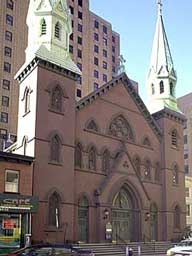
|
|
May 18, 2011 11:38:06
Posted By DelvecchioRC
|
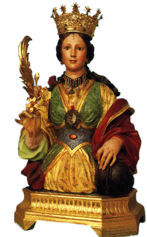
Brought to Sacred Hearts-St. Stephen Church by the people of Ischia, the image of Santa Restituta can be found on the Sacred Heart side of the church in the center of the second Altar from the entrance of the church.
She was said to be born at Carthage or at Hippo Diarrhytus (today known as Bizerte, Tunisia) and became a martyr under Diocletian. The exact place and time of her martyrdom lacks precise historical data. She is sometimes considered one of the Martyrs of Abitina, a group of North African martyrs that incluyes Dativus, Saturninus, and others.
A later medieval legend, recounted by Pietro Suddiacono in the 10th century and similar to legends associated with Saints Devota, Reparata, and Torpes of Pisa, states that after being horribly tortured, Restituta was placed in a blazing boat loaded with oakum and resin. Restituta was unharmed by the fire, and asked for aid from God. God sent an angel to guide her boat to the island of Aenaria (present-day Ischia), and she landed at the present-day site of San Montano. The legend further states that a local Christian woman named Lucina had dreamt of the angel and the boat. When she walked to the beach, she found the resplendent and incorrupt body of Restituta, who was now dead. Lucina gathered the population together and the saint was solemnly buried at the foot of Monte Vico in Lacco Ameno, where a paleochristian basilica was dedicated to her, and is now the site of a sanctuary dedicated to her.
However, the spread of her cult from North Africa to Italy is historically associated with the expulsion of Catholics from North Africa by Genseric, king of the Vandals, who followed the Arian sect. Her relics may have been brought to Naples in the fifth century by Gaudiosus of Naples when he was exiled from North Africa. A church, Santa Restituta, was built in her honour in Naples in the sixth century. The church was then incorporated into the Cathedral of Naples built on the same site in the 13th century. She is the patron saint of Lacco Ameno. She is especially venerated on the island of Ischia and at Lacco Ameno, where she is celebrated in a three-day celebration running from May 16 to May 18.
A crypt associated with Restituta can be found at Cagliari, in the neighborhood of Stampace.
|
Categories:
History,
Saints
|
May 13, 2011 09:05:54
Posted By DelvecchioRC
|
Today may be Friday the 13th, but it also May 13th - the Feast of Our Lady of Fatima.
The Following are the three secrets which were revealed by Our Lady
The first secret
"Our Lady showed us a great sea of fire which seemed to be under the earth. Plunged in this fire were demons and souls in human form, like transparent burning embers, all blackened or burnished bronze, floating about in the conflagration, now raised into the air by the flames that issued from within themselves together with great clouds of smoke, now falling back on every side like sparks in a huge fire, without weight or equilibrium, and amid shrieks and groans of pain and despair, which horrified us and made us tremble with fear. The demons could be distinguished by their terrifying and repulsive likeness to frightful and unknown animals, all black and transparent. This vision lasted but an instant. How can we ever be grateful enough to our kind heavenly Mother, who had already prepared us by promising, in the first Apparition, to take us to heaven. Otherwise, I think we would have died of fear and terror."
The second secret
You have seen hell where the souls of poor sinners go. To save them, God wishes to establish in the world devotion to my Immaculate Heart. If what I say to you is done, many souls will be saved and there will be peace. The war is going to end: but if people do not cease offending God, a worse one will break out during the Pontificate of Pius XI. When you see a night illuminated by an unknown light, know that this is the great sign given you by God that he is about to punish the world for its crimes, by means of war, famine, and persecutions of the Church and of the Holy Father. To prevent this, I shall come to ask for the consecration of Russia to my Immaculate Heart, and the Communion of reparation on the First Saturdays. If my requests are heeded, Russia will be converted, and there will be peace; if not, she will spread her errors throughout the world, causing wars and persecutions of the Church. The good will be martyred; the Holy Father will have much to suffer; various nations will be annihilated. In the end, my Immaculate Heart will triumph. The Holy Father will consecrate Russia to me, and she shall be converted, and a period of peace will be granted to the world."
The third secret,
"After the two parts which I have already explained, at the left of Our Lady and a little above, we saw an Angel with a flaming sword in his left hand; flashing, it gave out flames that looked as though they would set the world on fire; but they died out in contact with the splendour that Our Lady radiated towards him from her right hand: pointing to the earth with his right hand, the Angel cried out in a loud voice: ‘Penance, Penance, Penance!' And we saw in an immense light that is God: ‘something similar to how people appear in a mirror when they pass in front of it' a Bishop dressed in White ‘we had the impression that it was the Holy Father'. Other Bishops, Priests, Religious men and women going up a steep mountain, at the top of which there was a big Cross of rough-hewn trunks as of a cork-tree with the bark; before reaching there the Holy Father passed through a big city half in ruins and half trembling with halting step, afflicted with pain and sorrow, he prayed for the souls of the corpses he met on his way; having reached the top of the mountain, on his knees at the foot of the big Cross he was killed by a group of soldiers who fired bullets and arrows at him, and in the same way there died one after another the other Bishops, Priests, Religious men and women, and various lay people of different ranks and positions. Beneath the two arms of the Cross there were two Angels each with a crystal aspersorium in his hand, in which they gathered up the blood of the Martyrs and with it sprinkled the souls that were making their way to God."
|
|
|
|




